-
 Art of Wellness Acupuncture & Traditional Chinese Medicine (TCM)11704 Wilshire Blvd, Suite 295, Los Angeles, CA, 90025
Art of Wellness Acupuncture & Traditional Chinese Medicine (TCM)11704 Wilshire Blvd, Suite 295, Los Angeles, CA, 90025
myartofwellness@gmail.com310-451-5522 Office Hours
MonClosedTue7:30 am --4 pmWed7:30 am --4 pmThu7:30 am -- 4 pmFri7:30 am -- 4 pmSat7:30 am -- 4 pmSunClosedOur office opens from Tuesdays to Saturdays 7:30 am to 4 pm, will be closed on Memorial day, Independent day, Labor day, Thanksgiving day, Christmas and New year.
-
Recent Posts
- How to Treat Rosacea With Acupuncture and TCM
- How to Treat Perioral Dermatitis With Acupuncture and TCM
- Lymphatic Drainage With Acupuncture and TCM
- How to Treat Turf Toe With Acupuncture
- How to Treat Nerve Pain With Acupuncture and TCM
- How to Treat Watery Eyes With Acupuncture and TCM
- How to Treat Ovarian Cysts With Acupuncture and TCM
- How to Treat Dystonia With Acupuncture and TCM
- Can Acupuncture Help Bad Breath?
- How to Treat Atopy with Acupuncture and TCM
- Plantar Fasciosis Treatment With Acupuncture and TCM
- How to Protect Yourself When Air Quality Is Poor
- How to Treat Spinal Headache With Acupuncture and TCM
- How to Treat Sarcoidosis With Acupuncture and TCM
- How to Treat Flu With Acupuncture and TCM
- Chinese New Year 2025 Year of the Snake
- Sign up to receive news and updates and get my free report:“The Top 10 Reasons to Try Acupuncture”

July 2025 M T W T F S S 1 2 3 4 5 6 7 8 9 10 11 12 13 14 15 16 17 18 19 20 21 22 23 24 25 26 27 28 29 30 31
Depression
How to Treat Parkinson’s Disease With Acupuncture and TCM
By Qineng Tan, L.Ac., Ph.D. & Xiaomei Cai, L.Ac., Ph.D.
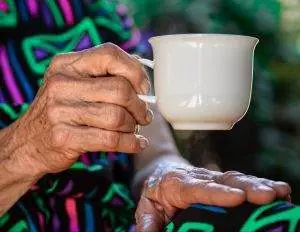
Hand tremor or shaky hands, stiffness in limbs, trouble walking, or problems with balance? These may be signs of Parkinson’s Disease (PD). Parkinsons is a progressive neurological disorder that primarily affects the brain cells that produce dopamine. Integrative care with acupuncture treatment may help relieve symptoms of Parkinson’s disease better than conventional treatments alone.
Parkinson’s disease is a neurological disorder that causes damage and dysfunction in brain cells, so that communications between the brain and the body don’t work the way they usually do. Sometimes a range of symptoms similar to those experienced by people with Parkinson’s occurs due to small strokes that affect the blood supply to the brain. This condition is called vascular parkinsonism.
More than ten million people are currently living with Parkinson’s disease worldwide. The chances of having PD increase with age, and men are more likely to have Parkinson’s than women. Early onset Parkinson’s can occur in people under 50. While it is often considered a movement disorder that causes hand tremors and other problems with mobility, Parkinson’s disease can cause less obvious symptoms, too.
Parkinson’s disease causes both “motor” and “non-motor symptoms;” the motor symptoms include physical problems like trembling hands or hand shaking, stiffness in the arms and legs, and trouble with balance when walking. The non-motor symptoms may include cognitive problems with memory, foggy-headedness, and trouble sleeping. It might even seem like a person’s personality and social behavior change, because they have trouble speaking and making their usual facial expressions.
Neurological diseases like Parkinson’s can slow the production of chemicals usually produced by the nervous system, including both dopamine and norepinephrine, a chemical that constricts blood vessels to raise blood pressure. It may be this lack of norepinephrine that causes some of the symptoms of Parkinson’s, such as low blood pressure, digestive problems, and fatigue.
Parkinson’s is a progressive disease, which means that people with PD go through stages as the condition affects more and more brain cells. In the early stages, the motor symptoms are mild and may only occur on one side of the body. In the later stages, a person may not be able to perform basic daily activities like getting dressed, eating, or walking without assistance.
What causes Parkinson’s disease? Medical science does not currently have an answer for why the brain cells become damaged or die in people with Parkinson’s. Scientists have observed that patients with Parkinson’s often have unusual clumps of a protein (alpha-synuclein) in their brain cells; these are called “lewy bodies” (lewy body parkinsons). These may be causing mutations in the cells that impair their ability to produce dopamine and other neurochemicals. Genetics, aging, and toxins in the environment or diet may all play a role in the development of Parkinson’s.
Conventional treatment for Parkinson’s involves finding a combination of medications that may help to reduce tremors and stiffness, and the myriad other symptoms a person with PD may experience. TCM offers an effective and safe adjunctive Parkinson’s treatment. Acupuncture treatment is widely accepted as a way to help relieve pain and nausea related to all types of diseases. TCM treatment can also have a positive effect on neurochemical activity, increase dopamine levels, help improve motor function and gait, and relieve fatigue.
Top 10 Symptoms of Parkinson’s Disease

The early signs of Parkinson’s are generally related to movements of the body, like feeling stiff when getting up or mild hand tremors. People may not realize that other symptoms, like low blood pressure and dizziness, are also related to early stage Parkinson’s. The most common symptoms of Parkinson’s disease include:
- Tremor – a small, involuntary shaking movement occurs most often in the hands, but can also be in a finger or thumb, or the chin. Sometimes called static tremor or resting tremor.
- Trouble moving or walking – limbs may feel stiff or rigid, there may be hip pain or shoulder pain. Most noticeably, the arms may not swing naturally when a person walks, or a person may shuffle, feeling it is hard to lift their feet off the floor. Movements that have been automatic for one’s whole life become challenging.
- Dizziness – fainting or feeling dizzy when you get up from sitting or lying down. This happens due to a sudden drop in blood pressure called orthostatic hypotension. A general feeling of weakness, feeling lightheaded, foggy headed, headache, blurred vision, and difficulty thinking or concentrating, and memory problems.
- Change in handwriting – this symptom is called micrographia, and it refers to a noticeable difference in a person’s writing, as they make smaller letters and the words are crowded closer together.
- Loss of smell, loss of taste, loss of appetite – many people with Parkinson’s develop an inability to smell in the early stage of the disease, known as olfactory loss. This can also affect a person’s ability to taste foods, which can lead to loss of appetite. Some medical theories suggest that Parkinson’s may begin in the olfactory region of the brain.
- Disturbed sleep, sleep disorder – sleep problems might simply be trouble falling asleep or trouble staying asleep, but they may also involve a lot of movement, or “tossing and turning,” or even talking in your sleep, crying out or yelling due to vivid dreams. Restless leg syndrome, when the limbs jerk, or leg cramps, may also be caused by Parkinson’s.
- Constipation, nausea, or trouble swallowing – cell damage in the gut may actually be one of the first symptoms of Parkinson’s, causing gastrointestinal problems due to slower movements of the smooth muscles of the digestive tract. Feeling nauseous or having a bloated stomach happens when the contents of the stomach empty too slowly into the intestine.
- Changes in the voice – people may notice that your voice sounds hoarse, weaker or more quiet than usual. This can be due to both motor and non-motor problems of PD, related to difficulty swallowing, sore throat due to heartburn, sensation of choking or food stuck in throat. It is also related to cognitive difficulties that make it harder to think of words, causing slow speech, or in other cases, talking too fast to be understood. Sometimes it may seem that a person with Parkinson’s doesn’t feel like talking much.
- Changes in facial expression – called “facial masking,” some people with Parkinson’s will find people asking them if they are upset because the expression on their face looks very serious, sad or angry, or they appear to be staring. This happens because of decreased motor function of the muscles of the face.
- Changes in posture – people with Parkinson’s may begin to hunch over while sitting, with shoulders hunched forward, or assuming a “stooped” posture while standing or walking. Again, this is due to a lack of communication between the brain and the muscles. This hunched posture can affect deep breathing, and increase the risk of falls.
Parkinson’s symptoms are complex, and vary widely from person to person. People with Parkinson’s are often subject to feelings of depression and anxiety, as well. Treatment for Parkinson’s symptoms requires a multipronged approach that addresses each individual patient’s physical, emotional, and mental health.
Medical Parkinson’s Treatment
When treating Parkinson’s, doctors will often try various combinations of drug therapy, some of which aim to replace dopamine, to help relieve tremors and other motor symptoms of PD. Levodopa/Carbidopa (or Sinemet) is a combination medication that creates a controlled release of dopamine. This can help to alleviate some symptoms, but the symptoms return when the medication is not in the bloodstream. Unfortunately, this medication can cause side effects like nausea and vomiting, and people will often need to take larger doses to get the same effect as the disease progresses. Long-term use sometimes causes dyskinesia, or involuntary movements of the limbs. Doctors may then prescribe another medication, such as Amantadine or Gocovri, to help mitigate these effects, or to help stave off motor symptoms during “off” times when the dopamine-replacing drugs wear off.
Patients with Parkinson’s will often be given other medications to help with problems like constipation, high blood pressure, sleep problems, pain, and depression. TCM and acupuncture offer a holistic way to treat many of the symptoms of Parkinson’s at the same time, without so many drugs and their potential side effects.
How Can Acupuncture Help Parkinson’s?

Part of TCM theory involves the concept of Ben and Biao, or “Root and Branch.” We observe that the expression of illness in the body is like the system of roots and branches of a tree. The branches show us the outward symptoms, while the root of the disease is hidden deeper under the surface, where we can’t see it. In order to treat the symptoms of any illness, we study the branches to find out where the problem originates, then we go to the root of the problem to solve it. We do this with a combination of acupuncture, herbs, and other modalities like moxibustion, cupping, and tuina massage. These TCM treatments allow us to address problems in the organ systems of the body, where lie the roots of illness, while at the same time, helping to relieve the pains and uncomfortable symptoms occurring in the branches.
Parkinson’s disease is considered by TCM philosophy to occur due to deficiencies in the root, which cause excess in the branches. Deficiency of the kidney, liver, spleen, blood and Qi (root problems) contribute to heat, phlegm, stasis, and wind in the limbs (branches). Tremors in the hands, and changes in facial expressions and movements are caused by Wind and Phlegm. According to TCM, Wind causes problems, often in the upper body, that come and go, such as stiffness, spasms, facial tics, and shaking of the limbs–like the wind shaking the branches of a tree. Wind can also cause symptoms like ringing in the ears (tinnitus), sudden headaches, and hives. Phlegm, which blocks the energy channels of the body, disrupts the smooth flow of blood and Qi to the limbs, creating a sense of stiffness, heaviness in the limbs, resistance to moving or speaking, staring, heavy feeling in the chest, and lack of coordination.
Acupuncture treatment for Parkinson’s disease, then, focuses on clearing heat, wind, and phlegm, strengthening and nourishing the blood, and getting the Qi moving smoothly again.
When we use acupuncture and herbs to help Parkinson’s, we see changes occurring in the neurochemical activity of the brain.
One study looked at the changes in neural response in the brain immediately after acupuncture treatment. This study concluded that after 8 weeks of treatment, patients with Parkinson’s showed significant improvement in brain function.
Another clinical study showed that acupuncture helped to increase levels of Tyrosine hydroxylase, a brain chemical involved in the production of dopamine.
TCM herbal formulas have also been clinically demonstrated to help relieve Parkinson’s symptoms like speech problems, tremors, and gait disturbances.
Research has shown that using TCM herbs to treat Parkinson’s is a safe and effective adjunctive therapy to conventional medical treatment.
Acupuncture Near Me for Parkinson’s Disease Santa Monica Westside

The goal of treatment for Parkinson’s is to slow down the progression of the disease and do what we can to maintain mobility and cognitive function. The sooner we begin treating Parkinson’s disease with acupuncture and TCM methods, the better chance we have to limit the effects of the disease and help patients stay active. If you or someone you love has Parkinson’s, consider adding a TCM doctor to your health care team. Integrative treatment for Parkinson’s with acupuncture and herbs can help treat Parkinson’s naturally.
*This article is for education from the perspective of Traditional Chinese Medicine only. The education provided by this article is not approved by FDA to diagnose, prevent, treat and cure human diseases. It should not stop you from consulting with your physician for your medical conditions. Traditional Chinese Medicine is based on Qi, which is an invisible force that usually cannot be observed by modern science. Because science focuses on testing ideas about the natural world with evidence obtained through observation, these aspects of acupuncture can’t be studied by science. Therefore acupuncture and Chinese herbs are often not supported by double-blind, randomized trials, and they are considered alternative medicine therapies in the United States.
How to Treat PMS With Acupuncture and TCM
By Xiaomei Cai, L.Ac., Ph.D. & Qineng Tan, L.Ac., Ph.D.

Monthly mood swings, bloated stomach, headaches, and weight gain. Why is PMS so bad? Premenstrual syndrome (PMS) is a set of symptoms that occur in the days before a woman gets her period. PMS symptoms affect every woman differently, and can be serious enough to disrupt your life every month. TCM is an effective way to deal with PMS, because acupuncture treatment can help relieve both physical and emotional symptoms of PMS and severe PMS, also known as PMDD (premenstrual dysphoric disorder).
To say that PMS is common among women is an understatement. The vast majority of women experience some changes in both their mental health and their bodies the week before their period starts. Whether or not a woman feels that it has a negative impact on her daily life may change over time. For some women, PMS isn’t a big deal; for others, it’s a major problem that can affect their relationships, impact their work, and make life hell every month.
Most women find their own particular pattern of PMS is somewhat predictable–until it isn’t. One of the most frustrating aspects of menstrual problems is the sense that things change without warning, and symptoms can come on suddenly with ferocious intensity. It can be difficult to describe how you feel before your period, because the symptoms seem to come and go. Some women find that their PMS symptoms are different from month to month. In some cases, they might find that every other month is bad, while the alternating months aren’t so bad. Why is PMS worse some months?
Other than the basic understanding that PMS is caused by fluctuations in hormones and brain chemistry, conventional medical science does not offer much in the way of clear answers about what causes PMS.
TCM provides a different framework for looking at menstrual problems and has been used to treat women’s health issues of all kinds for many centuries. TCM treatments including acupuncture, acupressure, moxibustion, and Chinese herbs can not only help relieve PMS symptoms, they can also be beneficial for other menstrual problems like irregular periods, PCOS, painful periods, endometriosis, heavy periods, fibroids, and symptoms of perimenopause.
Top 10 Symptoms of PMS
As a syndrome, PMS is considered a collection of symptoms that often appear together, in various combinations in different individuals. In the case of PMS, a woman may feel that her own symptoms change as often as every month, or gradually over the course of years. Girls in their teenage years may experience PMS in one way. Then, a woman in her early adult years may develop a different set of symptoms. After having a baby, a woman may find that her PMS symptoms have changed again. Then, many women in middle age experience changes in PMS symptoms as they go through perimenopause, approaching menopause. The most common signs of premenstrual syndrome include:
- Mood swings, low mood, feelings of sadness or anger
- Anxiety, feeling tense and irritable, cry easily or lose temper, want to be left alone
- Trouble sleeping, insomnia, disturbed sleep
- Breast tenderness, sore breasts, swollen breasts
- Food cravings, changes in appetite
- Weight gain, stomach bloating, water retention, pelvic pressure
- Gassiness, changes in digestion and elimination
- Acne, skin problems
- Changes in libido
- Headaches, migraines, difficulty concentrating, foggy head
Less obvious or well-known symptoms of PMS include: vision problems, tingling in the arms or legs, lack of coordination (clumsiness, dropping things), bruising easily, heart palpitations, dizziness, itchy skin, cold sores, toothaches, back pain, joint pain, and increased TMJ jaw pain.
Other health problems can be amplified during the premenstrual period, such as: chronic fatigue syndrome, fibromyalgia, interstitial cystitis, migraines, IBS, Meniere’s disease (dizziness, vertigo), clinical depression and anxiety disorders.
The physical and emotional aspects of PMS can affect each other, causing the typical mood swings. Feelings of sadness and frustration, or lack of sleep, may lead to comfort eating, but then the sight and sensation of your bloated stomach can cause you to feel depressed about your body. Minor problems with your spouse or co-workers can suddenly seem overwhelming and make you feel angry or helpless.
For some women, PMS symptoms are so bad that they feel unable to function the week before their period. Severe PMS is now diagnosed as PMDD.
What Is PMDD?

PMDD (premenstrual dysphoric disorder) is a severe form of PMS marked by intense emotional symptoms that dramatically impact a woman’s life, in addition to physical symptoms. “Dysphoria” is the opposite of “euphoria;” in other words, it is a mental state characterized by profound unhappiness and negative feelings. It is estimated that about 5% of all women experience this extreme type of PMS. Signs of PMDD include:
- Severe anxiety, panic attacks, paranoia
- Severe depression, in some cases even suicidal thoughts, lack of self-worth
- Anger and irritability that provokes rage and causes conflicts with other people
- Fatigue, low energy, inability to concentrate, feelings of confusion
- Intense food cravings, possibly leading to binge eating
Again, there is currently no scientific answer for what causes PMDD, although it is generally believed to be related to the way estrogen levels and progesterone levels change between ovulation and the onset of the menstrual period. Mood is considered to be related to serotonin levels in the brain, and this is why PMDD is usually treated with birth control pills, which suppress ovulation, and/or antidepressants (SSRIs), which affect serotonin uptake.
Medical Treatment for PMS
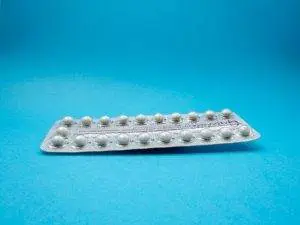
Naturally, when a woman asks for advice about PMS or PMDD, she is going to hear suggestions like: “try meditating, exercise more, eat a healthy diet, and get more sleep.” And it is true that making good lifestyle choices is an important part of helping to reduce PMS symptoms. But women who are suffering with serious PMS need solutions beyond these kinds of lifestyle guidelines.
When women complain of PMS symptoms, doctors will most often recommend OTC pain medications like ibuprofen or acetaminophen (NSAIDs) to relieve pain. Diuretics may be used to relieve bloating or premenstrual weight gain. Of course, most commonly, women are prescribed oral birth control pills, which suppress ovulation, and therefore may reduce the severity of PMS symptoms. More and more frequently, women may be prescribed antidepressants to try to deal with emotional symptoms and mood swings, or anxiety medications to take as needed during PMS. In effect, doctors often treat PMS the same way they would depression or anxiety.
Clearly, birth control pills are not helpful for women who may want to get pregnant, and some women may be concerned about how taking the pill or antidepressants may affect their fertility in the future. None of these pharmacological solutions for PMS address the root cause of the symptoms, and all of these medications carry side effects that may impact a woman’s overall health. Health care for women with TCM seeks to address the deeper internal causes of hormonal imbalances and other problems with the organ systems that are impacting the health of the ovaries and the regularity of the menstrual cycle.
Can Acupuncture Help PMS?

While it is only in recent years that conventional medicine has begun to acknowledge connections between physical health and emotional health, TCM has understood for many hundreds of years that health conditions of all kinds, especially those related to the menstrual cycle, are rooted in the balance of energies. Menstruation represents an ongoing process of transformation that occurs not only within the reproductive organs, but which affects every part of a woman, and even the people around her.
The concept of Yin and Yang in Chinese philosophy describes two opposing yet complementary forces that are constantly acting upon each other in order to achieve balance. The menstrual cycle is very much based on Yin and Yang energies; during the follicular phase of the cycle (before ovulation), Yin is increasing while Yang is decreasing, and in the luteal phase (after ovulation, before the period), Yang is increasing while Yin is decreasing. The system is designed, naturally, to create the right conditions for conception; this process of Yin and Yang exchange is what determines a woman’s fertility.
While the health of the uterus and ovaries is definitely central to the process, within the TCM philosophy, they are not the only organs involved with menstruation. The Kidneys, Liver, and Heart all have important roles to play, as well. In TCM, we also view the elements of Fire–to provide warmth, controlled by the Heart–and Water, controlled by the Kidneys–to provide moisture, as being vital to all processes within the body, especially to menstruation. Blood is cleansed, stored, and then distributed to the other organs by the Liver. Blood being central to the process of menstruation, the Liver’s role is really key in how the whole thing plays out.
According to TCM theory, most PMS and PMDD symptoms are caused by problems with Liver Qi. When the Liver Qi is out of balance, it can lead to feelings of anger, frustration, depression, and irritability. The Liver system is particularly susceptible to negative effects of stress.
There are a few different variations of Liver Qi imbalance and other patterns that can contribute to PMS symptoms:
- Liver Qi invasion – This is a condition of excess, in which there is too much rising Liver Qi, characterized by overall negative emotions that are disruptive, including anger and anxiety, breast tenderness, headaches, dizziness, and constipation.
- Liver Qi depression – In this case, there is not enough Liver Qi, causing feelings of sadness, heaviness in chest, painful swelling of breasts, sighing, bloated stomach, lack of appetite, cramping during period, scanty blood during period.
- Spleen Kidney deficiency – In this case, stagnant energy in the Kidney system is preventing water from moving appropriately, causing water retention or edema.
From the scientific medical standpoint, acupuncture treatment has been shown to have a positive effect on neurotransmitters like serotonin, and to impact levels of estrogen and progesterone. This happens naturally because we are using TCM methods to restore optimal function of all the organs. With Chinese herbs we are able to get specific nutrients into the body that we cannot get from the foods we normally eat.
Acupuncture treatment accompanied with specific herbs for PMS patterns can help balance the liver Qi, and bring all of the organs into synergistic harmony.
In order to make lasting change, it is best to have acupuncture treatment at least once or twice a week. We need to deal with each phase of the menstrual cycle as it occurs by tailoring the acupuncture treatment and herbs to your PMS and period symptoms.
A systematic review of ten controlled trials using acupuncture to treat PMS concluded that TCM treatment of PMS significantly improved symptoms.
Top 3 Tips for PMS Relief From TCM Perspective

There are still a lot of taboos surrounding women’s health, and many girls and women have never learned how to take care of their reproductive health. Working with an experienced TCM doctor will enable you to get personalized care and advice about how to eat the best diet for PMS symptoms, what activities to avoid before your period, and other female hygiene tips that you may not have heard before.
- Nutrition – conventional Western thinking about healthy eating currently focuses on eating fresh, whole foods, which is good, except that people tend to think this means eating a lot of foods raw or cold, as in salads and smoothies. According to the TCM philosophy of nutrition, though, eating cold foods is actually one of the worst things you can do when it comes to relieving PMS and painful periods. Putting a lot of cold food into the stomach cools down the temperature of the other internal organs, which can contribute to more cramping and worse cramps. During the week before your period, concentrate on eating plenty of nourishing, cooked foods like soups and stews, proteins and vegetables, and whole grains like brown rice and quinoa. Avoid too much dairy, sugar, caffeine, hot, spicy or fried foods (that includes chips and crackers), and definitely avoid icy cold beverages and frozen treats.
- Keep track of your period – there are many apps available now to help with this, but it can also be a simple chart with room for notes about your symptoms. Keeping track of your PMS symptoms every month can help you recognize patterns in your own behaviors and experiences. A record of PMS symptoms will also help you communicate what you’re feeling to your health care providers when you are seeking treatment for PMS or PMDD.
- Exercise – gentle movement modalities that move Qi through the body are great to help PMS: Tai Qi, yoga, or dancing are all good. Avoid deep twists that could squeeze or put pressure on the ovaries and other organs. Again, keep track of your exercise routines and how they affect your physical and emotional wellbeing from month to month so that you can see which type of workout is best for you, or if some types of exercise make PMS worse.
Acupuncture Near Me for PMS in Los Angeles, CA
Many women come to us at Art of Wellness seeking help with menstrual problems or fertility issues. We have over 30 years of experience in helping to relieve symptoms of PMS and all types of period pain and dysfunction. It is possible for the menstrual cycle to flow without extreme feelings or strong physical discomfort. If you feel like PMS or PMDD is negatively impacting your life every month, please do not hesitate to give us a call.
*This article is for education from the perspective of Traditional Chinese Medicine only. The education provided by this article is not approved by FDA to diagnose, prevent, treat and cure human diseases. It should not stop you from consulting with your physician for your medical conditions. Traditional Chinese Medicine is based on Qi, which is an invisible force that usually cannot be observed by modern science. Because science focuses on testing ideas about the natural world with evidence obtained through observation, these aspects of acupuncture can’t be studied by science. Therefore acupuncture and Chinese herbs are often not supported by double-blind, randomized trials, and they are considered alternative medicine therapies in the United States.
How to Quit Smoking With Acupuncture and TCM
By Xiaomei Cai, L.Ac., Ph.D. & Qineng Tan, L.Ac., Ph.D.

Have you been trying to stop smoking, but are having a hard time quitting? You know that quitting smoking will definitely improve your overall health and longevity, but that doesn’t mean it’s easy to do. Acupuncture treatment can reduce cravings, alleviate withdrawal symptoms of nicotine, and help relieve anxiety you feel when you stop smoking.
Smoking tobacco causes several million unnecessary deaths every year, and is associated with multiple chronic diseases, including lung disease, cardiovascular disease, diabetes, lung cancer and other types of cancer. But deaths related to smoking are just the tip of the iceberg. According to the CDC, over 16 million Americans are currently living with a chronic disease caused, at least in part, by smoking. Smoking increases the risk of stroke, erectile dysfunction in men (ED), low sperm count, and autoimmune diseases such as rheumatoid arthritis. On average, smoking takes ten years off a person’s life.
Why do we keep doing this to ourselves? Because once you have a smoking habit, quitting smoking is very hard. Tobacco contains a natural chemical called nicotine. Nicotine is a highly addictive substance. It acts upon the neurotransmitters in the brain that release dopamine: the “feel-good” chemical. When you inhale tobacco smoke, nicotine goes directly to your brain, and you get an immediate “reward” in the form of dopamine. Once your brain gets used to this reaction, it wants more of it. Even when you know you should stop smoking, and you want to quit, a part of your brain is signalling you not to stop.
Vaping, or smoking from a vape pen, or e-cigarette, is the latest trend. There has been some suggestion that this form of smoking causes less damage than cigarettes do, because Juul pens don’t have many of the toxic additives that are in regular cigarettes. So far, researchers don’t know how long-term vape use will affect people’s overall health. However, it is clear that people who vape can easily become just as addicted to nicotine as smokers of cigarettes, cigars, and pipes do.
Once the brain has become attuned to the dopamine reaction caused by nicotine, a very powerful social-emotional component is added to the physical, chemical component. Being in a place where you have smoked in the past, seeing a friend who smokes, smelling smoke in the air, and of course, seeing an ad for cigarettes–all these sorts of cues in your daily environment can have a dramatic impact on your desire to smoke.

Almost half of all smokers in the U.S. make an attempt to quit smoking each year. But, obviously, people fail in their attempts to stop smoking all the time. Nicotine withdrawal symptoms include intense anxiety. When faced with a powerful combination of physical and emotional stress, most people will return to that quick fix. Even when a person develops serious problems due to smoking, like a constant cough, emphysema, sleep apnea/snoring, infertility, acid reflux/heartburn, loss of smell and taste; even when a person knows that second hand smoking can hurt their loved ones, they still may find it impossible to quit. People need help to quit smoking.
Typical smoking cessation aids include nicotine gum or patches, medications, and programs designed to educate and support people as they try to overcome smoking addiction. While these methods offer help, they do not work for everybody. Most people have to try to quit smoking many times and try different methods before finding success.
Many people gain weight when they quit smoking, because the cravings for a cigarette are replaced by cravings for sweets or other foods and drinks that keep your hands and mouth occupied. It’s more than just an oral habit, though; nicotine affects the way your body uses insulin and releases glucose, so when you quit smoking, there is a very real change in blood sugar levels and a subsequent desire to eat more carbohydrates. When it feels like you have to choose between two different risk factors–being a smoker, or being overweight–,it may seem like a hopeless situation.
TCM for smoking cessation offers a different, multi-pronged approach. With acupuncture treatment for nicotine addiction, we can work on several of the problems smoking causes at the same time. Using acupuncture to stimulate specific pressure points for reducing cravings and alleviating symptoms of smoking withdrawal is only one way that TCM can help people quit smoking and regain good health. Our TCM detox program may also be helpful.
Top 10 Symptoms of Nicotine Withdrawal
When you try quitting smoking “cold turkey,” you will probably feel more severe symptoms of withdrawal for the first few days. Withdrawal symptoms can last for several weeks. Nicotine withdrawal symptoms include:
- Intense cravings for a cigarette that last for 5-10 minutes
- Feelings of anxiety and stress
- Food cravings, weight gain, rise in blood sugar
- Sleep problems, insomnia
- Persistent cough, “smoker’s cough”
- Flu-like symptoms: fever, fatigue, body ache, headache
- High blood pressure, fast heart rate
- Memory problems, difficulty concentrating
- Dizziness
- Constipation, bloated stomach
Medical Approach to Quitting Smoking
Nicotine replacement therapy (NRT) has been the common form of help for nicotine withdrawal for decades. This involves using nicotine patches, nicotine gum, or lozenges, which help people gradually wean themselves off of nicotine by lowering the dose over time. Nicotine patch side effects can include a rapid heart beat, dizziness, headaches, and nausea.
Medications such as Zyban and Chantix are also used to help people quit smoking. Zyban (Bupropion) is also known as Welbutrin, which is used to treat depression. A prescription medication called Varenicline (Chantix) is the newest medical treatment available to help people stop smoking. Varenicline works by blocking the receptors in the brain that react to nicotine to stimulate dopamine production. Varenicline is still fairly new, and researchers do not yet know the long-term effects of taking it. Common Chantix side effects include nausea, insomnia, and headaches; more serious psychiatric reactions, such as depression and suicidal ideation have also been reported. Drug interventions for smoking cessation are more effective when combined with education and counseling.
The most effective methods to help people stop smoking treat both the brain chemistry that is causing nicotine addiction and the emotional symptoms that arise when quitting. TCM methods of acupuncture and herbs are naturally able to help address addiction because they work on the whole person–physically, mentally, and spiritually.
How Can Acupuncture Help You Quit Smoking?

In conventional medical terms, we mostly think of cigarette smoking as being harmful to the lungs, due to smoke inhalation, and the cardiovascular system, due to the well-known fast heartbeat we associate with nicotine use. In TCM, we do consider that smoking weakens the lungs, but this, in turn, causes problems in the other major organ systems of the body. A buildup of heat in the Heart and Stomach can lead to stagnant Liver Qi. These forces are what cause the withdrawal symptoms of anxious feelings, heart palpitations, irritability, food cravings, and poor sleep. With acupuncture and herbs, we work to clear heat and detoxify the lungs and all of the organs.
A specific set of points on the outer ear are often used to help combat the cravings associated with overcoming addictions of all kinds, including nicotine dependence. Often we will send a patient home with small ear seeds fixed to these points so that they can be squeezed and stimulated whenever you feel an urge to smoke. This will also help with food cravings and prevent overeating and weight gain when you quit smoking.
Acupuncture helps to release endorphins, replacing the familiar dopamine hit with a different sense of relaxation. Endorphins promote a sense of wellbeing and relieve pain. Dopamine works on the reward center of the brain, causing a mental and emotional reaction that leads to addiction. Acupuncture treatment works holistically to help relieve emotional pain–symptoms of anxiety and depression–by positively impacting neurochemical activity. Shifting from dopamine dependence to more abundant endorphins and serotonin will help restore restful sleep.
A controlled trial study compared patients who received acupuncture, patients who received acupuncture and education and counseling, and patients who received sham acupuncture to help them quit smoking over a period of four weeks. The percentage rate of patients who had quit smoking after 18-month follow up was highest among those who received acupuncture, and especially highest among those who had acupuncture and counseling.
A study of almost 3000 people who received acupuncture treatment for smoking over an eight week period showed that the treatment helped many people abstain from cigarettes, and helped many more to cut back on how many cigarettes they smoked.
Chinese Medicine Near Me to Stop Smoking in the Great Los Angeles Area
The decision to quit smoking for good can be a life-changing one. But for most people, it’s also one of the most difficult things they will ever do. Cigarettes are addictive, and to stop smoking, you may need professional help. If you’ve already tried NRT and not been able to finally quit, you may want to consider trying the TCM approach. Whether you chain smoke or only vape socially, whether you are quitting smoking because you want to increase your chances of getting pregnant, or you have lung cancer stage 4, it is never too early or too late to stop smoking. Acupuncture for smoking cessation can help you get past the cravings for cigarettes that make it so hard to quit. Acupuncture and herbs can not only help you kick the habit, but can also help you get rid of that cough, brighten your skin, and sleep better. Most of all, you will have made an important choice to prioritize your health and prevent chronic illness from taking hold later in life.
*This article is for education from the perspective of Traditional Chinese Medicine only. The education provided by this article is not approved by FDA to diagnose, prevent, treat and cure human diseases. It should not stop you from consulting with your physician for your medical conditions. Traditional Chinese Medicine is based on Qi, which is an invisible force that usually cannot be observed by modern science. Because science focuses on testing ideas about the natural world with evidence obtained through observation, these aspects of acupuncture can’t be studied by science. Therefore acupuncture and Chinese herbs are often not supported by double-blind, randomized trials, and they are considered alternative medicine therapies in the United States.
How to Treat Herpes Simplex With Acupuncture and TCM
By Qineng Tan, L.Ac., Ph.D. & Xiaomei Cai, L.Ac. Ph.D.
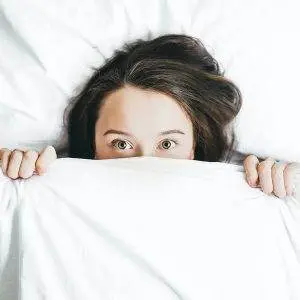
Cold sores around mouth, blisters on lips? Burning, itching sores around the genital area? Herpes simplex is a skin disorder caused by one of two viral infections: HSV-1 or HSV-2. TCM methods, including acupuncture and herbs, can help clear up a painful herpes outbreak and prevent herpes simplex outbreaks in the future.
Herpes simplex is one of the most common kinds of infectious disease, affecting several billions of people worldwide. It is estimated that about 66% of the world’s population has had a HSV-1 infection at some point in their lives. Herpes simplex virus type 1 (HSV-1) is the viral infection that is associated with oral herpes or orolabial herpes–the one that causes sores around the mouth, often referred to as “cold sores” or “fever blisters.” Herpes simplex virus type 2 (HSV-2) is the kind that causes genital herpes. Herpes virus is related to varicella-zoster viruses, the viruses that cause Chickenpox and Shingles.
How do you get herpes? The skin infection caused by herpes simplex spreads from person to person through close contact. HSV-1, or oral herpes, can spread through sharing utensils, toothbrushes, or towels, or by touching one of the mouth sores, or kissing. HSV-2, or genital herpes, is usually spread through sexual contact is therefore considered a sexually transmitted disease (STD). In fact, either one of the two viral infections can cause sores on the mouth or genital area, or even on other parts of the body. If oral herpes, or HSV-1, gets into the eyes, it can cause serious damage, even causing scarring or permanent loss of vision.
A person can pass herpes to another person even if they aren’t having an active outbreak with visible sores. A pregnant woman can pass the herpes virus to her baby during birth, and the virus can also be passed during breastfeeding. Once a person has been infected with HSV-2, the virus stays in the body and can lie dormant, then resurface in periodic recurrent outbreaks.
Initially, herpes skin disorders manifest in the skin cells, causing the red, painful, blister-like sores. After a while, the infection moves deeper, into the nerve cells, where it can lie dormant until something happens to activate it again, like an illness or stressful life event.
Medical treatment for herpes simplex focuses on minimizing the pain of an outbreak of sores and attempting to prevent future outbreaks with antiviral medications. People who have genital herpes must take care to practice safe sex and avoid sex during outbreaks in order to prevent spreading herpes to their partners. People with herpes can suffer from depression brought on by the knowledge that they may have to live with this highly contagious viral infection for the rest of their lives, and with the danger of possibly transmitting herpes simplex to others with whom they are intimate.
Fortunately, TCM herbs and acupuncture offer an alternative medicine option for dealing with herpes simplex. TCM can help with quick healing of the burning sores that signify an outbreak, but can also work on a deeper level to strengthen the immune system so that it can fight the virus better from within.
Top 5 Symptoms of Herpes Simplex
Signs of a herpes simplex infection depend on which type of viral infection you have, and where the infection spreads. Usually, symptoms manifest either around the mouth or genital area, but sometimes the herpes virus can spread to the eyes (herpes keratitis). The most common symptoms of herpes include:
- Itching, burning, tingling around the mouth or genital area
- Painful, fluid-filled blisters or sores around the mouth or genital area
- Flu-like symptoms: fever, body aches, swollen glands
- Trouble urinating, burning sensation when peeing
- Pain in eyes, cloudy vision
Once a person has had their first symptomatic period of a herpes infection, they may have recurrence of symptoms periodically–in some cases, frequently. The majority of people who have been infected with HSV-2 experience another outbreak within a year; some people experience recurrent outbreaks several times a year or as often as once a month.
There are a few other skin conditions that might sometimes be mistaken for herpes simplex. Impetigo is a bacterial infection that can cause red sores to form around the mouth and nose. “Jock itch” is a fungal infection that can cause a red rash in the groin area. Folliculitis is when hair follicles become inflamed and form pimples with pus; this can happen in the facial or genital region due to shaving, but it can also be related to herpes, if the viral infection causes irritation and blockages in the hair follicles. Molluscum contagiosum is another viral skin infection that causes raised lesions to form; however, they are generally painless and flesh-colored, not similar to herpes lesions. Bacterial vaginosis, a common bacterial infection which can cause a burning sensation in the vagina, may increase a woman’s chances of getting herpes and other STDs.
What Triggers a Herpes Outbreak?
The herpes virus is similar to the varicella virus (chickenpox) in that it stays in the body long after the initial infection, and can flare up and cause trouble later on. The varicella virus can lie dormant for many years, and then emerge as a case of Shingles late in life, causing a very painful rash.

Herpes can cause rare or frequent outbreaks, depending on the severity of the initial infection, how or if it was treated, and what sort of care a person takes to prevent recurrences. A person who has experienced recurrent outbreaks may become aware of early signs that show up a few days before sores actually break out on the skin, such as tingling or shooting pain in the genital area or around the hips or legs.
The things that can trigger a herpes simplex outbreaks include:
- Illness, fever
- Suppression or weakness of the immune system
- Exposure to sunlight, changes of the season or temperature
- Menstrual period, hormonal changes
- Prolonged period of stress, emotional stress
- Surgery, trauma
Medical Treatment for Herpes Simplex
The typical treatment for herpes simplex HSV-1 and HSV-2 includes the use of antiviral medications such as acyclovir (Zovirax), famciclovir (Famvir) and valacyclovir (Valtrex). These medications may be taken intermittently, to help treat outbreaks when they occur, or, in some cases, may be recommended for daily usage to help prevent outbreaks from occurring. For some people, these medications help to reduce the frequency of outbreaks, and there is some evidence that they may help prevent a person’s sexual partner from being infected. However, these antiviral medications do not help everyone who has herpes simplex. They can only reduce the spread of the virus in the body; they do not eliminate it completely. Some people may become allergic or resistant to the drugs. Some people experience side effects, including potentially serious kidney problems or unusual bleeding.
TCM treatment with herbs and acupuncture can help to reduce the severity of herpes outbreaks and prevent recurrence, without any negative side effects.
Can Acupuncture Help Herpes?
From the TCM point of view, the redness and burning of the blister-like rash that accompanies viral infections like herpes and varicella is caused by heat and dampness. Clearing heat and damp from the liver and gallbladder will usually be one of the primary goals of acupuncture treatment and herbal supplementation, as this will help to quickly cool down an outbreak of the painful sores. Maintaining the health and balance of the liver system long-term will help to prevent future outbreaks.
TCM also factors in emotional well-being when considering each individual’s presentation of a disease. The flare up of herpes simplex viral infection is associated with stress and negative emotions, especially anger. Anger is connected to the Liver and Gallbladder, and also to the eyes, which is why sometimes the herpes skin disorder will manifest in the eyes. Learning lifestyle behaviors and dietary choices that will help to balance the emotions and reduce excess heat in the body will also help reduce the occurrence of herpes flare ups.

Some herbal formulations work well to heal sores related to herpes outbreak. There are also specific Chinese herbs that function as “antivirals.” These herbs can help control the virus in the body, which, when combined with treatment and herbs that strengthen the immune system, can be effective at reducing the risk of recurrent outbreaks of herpes.
Acupuncture Near Me for Herpes Simplex
While herpes simplex is often considered a disease one has to “learn to live with,” it is not necessary to suffer the pain and emotional burden of herpes simplex infection without relief. Alternative medicine for herpes in the form of acupuncture and herbs offers a holistic treatment option that can help relieve the physical symptoms of recurrent herpes outbreaks as well as associated mental and emotional struggles with shame, anxiety, depression, and relationship concerns. Boosting the immune system, strengthening the Qi and organ systems, reducing heat through proper nutrition, and relieving stress can all work to help people with herpes live free of the fear of the next outbreak.
*This article is for education from the perspective of Traditional Chinese Medicine only. The education provided by this article is not approved by FDA to diagnose, prevent, treat and cure human diseases. It should not stop you from consulting with your physician for your medical conditions. Traditional Chinese Medicine is based on Qi, which is an invisible force that usually cannot be observed by modern science. Because science focuses on testing ideas about the natural world with evidence obtained through observation, these aspects of acupuncture can’t be studied by science. Therefore acupuncture and Chinese herbs are often not supported by double-blind, randomized trials, and they are considered alternative medicine therapies in the United States.
How to Stop Snoring With Acupuncture and TCM
By Qineng Tan, L.Ac., Ph.D. & Xiaomei Cai, L.Ac., Ph.D.

Have you been told you’re snoring loudly? Do you feel tired even after 8 hours of sleep? Waking up with a dry mouth, feeling tired all the time, and having trouble staying asleep at night are all signs that you might have sleep apnea. Sleep apnea is a sleeping disorder in which normal breathing is interrupted repeatedly. Acupuncture and TCM offer a natural way to treat obstructive sleep apnea, insomnia, fatigue, and other sleep-related problems.
Sleep Apnea (also known as sleep apnoea) is when a person does not breathe normally during sleep. When there is a pause in normal breathing during the night, the body is not getting enough oxygen, and the brain sends an urgent message to start breathing again. The person wakes, so briefly that they usually do not remember it, gasps for air and starts breathing again. Often people do not realize that they are snoring or making snorting or choking sounds while they sleep unless another person tells them it’s happening. Because of this, many cases of sleep apnea go undiagnosed, and people go on feeling fatigued all the time.
While people of any age or gender can experience sleep apnea, it is most common among older men. There are a few different kinds of sleep apnea; the most prevalent type is obstructive sleep apnea (OSA), in which the throat and/or airway is physically obstructed by the positioning of the neck, jaw, and soft tissues of the throat, like the tongue and uvula. OSA is associated with being overweight or obese, because extra weight can affect the musculature of the upper respiratory system. Women who have already gone through menopause are more likely to develop sleep apnea because postmenopausal weight gain is more likely to occur in the upper body than it does prior to menopause. Sleep problems and obesity are related in many ways; getting less sleep or poor quality sleep can cause people to gain weight or have trouble losing weight. People with diabetes and/or metabolic syndrome are also at higher risk for obstructive sleep apnea.
Besides disturbing sleep and causing fatigue, apnea can lead to other serious health conditions, especially cardiovascular problems like high blood pressure, irregular heartbeat, and stroke. Sleep apnea can increase the heart rate and the production of stress hormones. Men with OSA are more likely to experience erectile dysfunction (ED). Lack of quality sleep can also have a negative impact on mental health, contributing to depression, anxiety, and cognitive decline.
The typical treatment for snoring involves the use of a sleep apnea machine, called a CPAP machine (continuous positive air pressure machine), which pushes air into the nose while you sleep, ensuring that the airway stays open and continuously active. This treatment can help people breathe easier throughout the night, but some people may find the machine noisy and uncomfortable.
TCM methods like acupuncture treatment for snoring and sleep apnea offer a way to address these problems at their source holistically, helping people to sleep well and breathe more freely.
Top 3 Types of Sleep Apnea
Sleep apnea causes loss of oxygen due to shallow breathing (hypopnea) and/or interrupted breathing while sleeping. Different types of sleep apnea are classified by their physiological causes:
- Obstructive sleep apnea (OSA) – this is caused by the improper relaxation of the throat muscles while sleeping.
- Central sleep apnea (CSA) – is caused by disordered signalling from the brain to the organs that control breathing.
- Complex sleep apnea – (or treatment emergent sleep apnea) is a combination of both of the above.
Restless legs syndrome (RLS), also known as Willis-Ekbom disease, is a condition wherein a person has an uncontrollable urge to move the legs, or sometimes arms or other parts of the body, accompanied by a sensation of itching, burning, crawling or throbbing. This usually happens when the person is lying in bed, trying to fall asleep. Restless leg syndrome can coexist with OSA, compounding the problem by making it difficult to get to sleep or stay asleep during the night.
Narcolepsy is a sleeping disorder in which overwhelming sleepiness during the daytime causes people to suddenly and uncontrollably fall asleep. Many people who suffer from narcolepsy also have sleep apnea. In this case, the sleep problem is not related to breathing so much as how the brain and body are moving through sleep cycles, like REM sleep. For people who have narcolepsy, treatment with a CPAP machine is often not very helpful.
Sleep apnea or snoring does not seem to be related to other abnormal sleeping behaviors (parasomnia), such as sleepwalking, night terrors, or sleep-related eating.
Top 10 Symptoms of Sleep Apnea
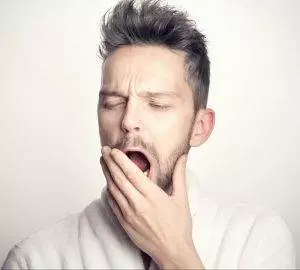
Many people snore and do not realize it. It is important to pay attention to the subtler sleep apnea symptoms. Signs of sleep apnea include:
- Loud snoring
- Interrupted breathing – moments during the night when the person’s breathing actually stops and then starts again
- Gasping for air while sleeping
- Waking up with a dry mouth or sore throat
- Headaches in the morning
- Insomnia, difficulty getting to sleep or staying asleep during the night
- Feeling very sleepy during the daytime (hypersomnia)
- Difficulty paying attention
- Feeling irritable
- Getting up often during the night to urinate (nocturia)
What Causes Snoring?

Sleep apnea is caused either by a physical obstruction of the throat and airways or by problems with brain signals to the breathing apparatus. Not everyone who has sleep apnea snores loudly. On the other hand, not everyone who snores necessarily has sleep apnea. Other reasons people snore may include:
- Congestion of the nose due to a cold or allergies
- In late pregnancy, the growing belly puts upward pressure on the respiratory system
- Sleeping pills, medications that work as relaxants, like Ativan or Valium
- Alcohol consumption
- Anatomy – large tongue or uvula, or swollen tonsils
People with sleep apnea are often advised to sleep on their side rather than on their back, as this helps prevent the obstruction, but it can be difficult for people to control their behavior while sleeping.
Treatment for Sleep Apnea
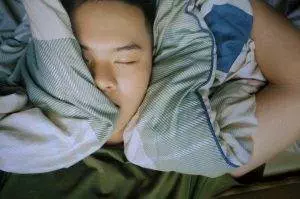
To firmly establish whether a person has sleep apnea, and what type, doctors will often evaluate the situation in a sleep study session. People will spend the night in a sleep center, where their heart and breathing functions are monitored (polysomnography).
CPAP machines are generally considered to be the best care available for sleep apnea. These devices can help stop snoring, allow a person to get more restful sleep, and cut the risks of serious issues like heart disease that are associated with sleep apnea. However, the machine does not actually do anything to improve the weak musculature that causes OSA or the disordered signalling that causes CSA. It is possible to swallow air while breathing with the CPAP machine, which can lead to gas and a bloated stomach. Some people may find the face mask, which must be strapped to the face, uncomfortable. The noise of the machine may be disturbing to the person using it, as well as to the person’s bed partner. It may be difficult for some patients to get used to using the machine, and if they are not using it regularly, they are not getting the health benefits.
There are also some oral appliances available, such as mandibular advancement devices (MAD), which are worn in the mouth to alter the placement of the jaw and tongue in order to keep the airway open during sleep. These can also be effective in terms of helping people breathe better while they sleep. Compared to CPAP, they are quiet, discreet, and cost-effective. Again, the main question is whether a person will be able to tolerate the device; some people may experience toothache or dental pain, TMJ jaw pain, dry mouth, or too much saliva.
Surgery for snoring and sleep apnea is usually only recommended if other methods of treatment have failed. Different procedures involve removing soft tissues (uvula, tonsils, adenoids), or changing the shape of the jaw bones. Small rods may be inserted into the upper palate to help keep the airway open. A device that monitors breathing and stimulates movement of the tongue may be implanted in the chest.
Sometimes people may use melatonin as a natural sleep aid. Melatonin may have a positive impact in terms of helping people fall asleep more easily. It also has strong antioxidant properties, which means it may help with the control of the breathing apparatus and the amount of oxidation a person is getting while sleeping. While it is generally considered safe as a health supplement, melatonin side effects can include problems with dizziness, headaches, and nausea, and it can also be contraindicated with other medications. Melatonin can affect blood coagulation, so it may be unsafe to take if a person is also taking blood thinners, for example.
Can Acupuncture Help Stop Snoring?
According to TCM theory, the spleen and stomach are responsible for transforming nutrients from food and fluids into Qi (life energy), which is then delivered to the heart and lungs. In the TCM view, sleep apnea is often a problem related to phlegm and Qi stagnation, as are many conditions related to fatigue or insomnia. If phlegm builds up and becomes stagnant in the spleen, the lungs cannot get the Qi they need. So, one possible differentiation for sleep apnea is Spleen Deficiency with Qi Stagnation. This condition of dampness and phlegm will often cause people to feel heavy and bloated.
In some cases, too much internal heat contributes to the problem. Snoring, combined with sweating, and waking up with a sore throat, is a sign that we need to clear heat and toxicity from the body.
Sleep disturbed by nightmares is associated with the gallbladder, while difficulty falling asleep is associated with the liver. An acupuncture practitioner will listen carefully to what specific symptoms of sleep apnea each individual patient is experiencing, and tailor the treatment accordingly.
A meta-analysis of over 200 randomized trials involving the use of acupuncture to treat sleep apnea concluded that acupuncture was more effective overall than CPAP treatment, in terms of improving breathing and oxygen levels.
Can Chinese herbs help snoring and sleep apnea? Specific herbs have been shown to help reduce inflammation and improve oxygen levels in patients with sleep apnea. Chinese herbal formulations can help stop snoring and reduce daytime fatigue.
Natural Remedies for Snoring

Acupressure can help snoring and sleep apnea. Since we are trying to clear heat and phlegm from the stomach, spleen, and large intestine, use acupressure points along the Stomach Meridian, which runs down the leg. On the front of the shin, apply pressure, kneading with your thumb, starting to the side of the shin bone a few inches below the knee, then moving down about 3 inches and doing the same thing. Knead each of the four points about 30 times as your move down the leg. If you are aware that one side of the nose is more blocked than the other while you are breathing during the night, practice the acupressure on the opposite leg. For example, if your left nostril is the one that is more stuffed up, do acupressure on the right leg.
Acupuncture Near Me for Snoring
As the population ages, and unfortunately, more people suffer from obesity and metabolic syndrome, sleep apnea is a growing health concern all over the world. Snoring can have a seriously negative impact on quality of life, health, and longevity. Conventional methods of treatment for sleep apnea can be effective, but many people find CPAP uncomfortable and inconvenient for long-term use. If you suspect you may have sleep apnea, or are worried because your partner snores loudly at night and seems to be gasping for air, do not wait to get help. Acupuncture and TCM herbs can help relieve fatigue due to snoring and reduce the risk of more serious problems related to sleep apnea.
*This article is for education from the perspective of Traditional Chinese Medicine only. The education provided by this article is not approved by FDA to diagnose, prevent, treat and cure human diseases. It should not stop you from consulting with your physician for your medical conditions. Traditional Chinese Medicine is based on Qi, which is an invisible force that usually cannot be observed by modern science. Because science focuses on testing ideas about the natural world with evidence obtained through observation, these aspects of acupuncture can’t be studied by science. Therefore acupuncture and Chinese herbs are often not supported by double-blind, randomized trials, and they are considered alternative medicine therapies in the United States.